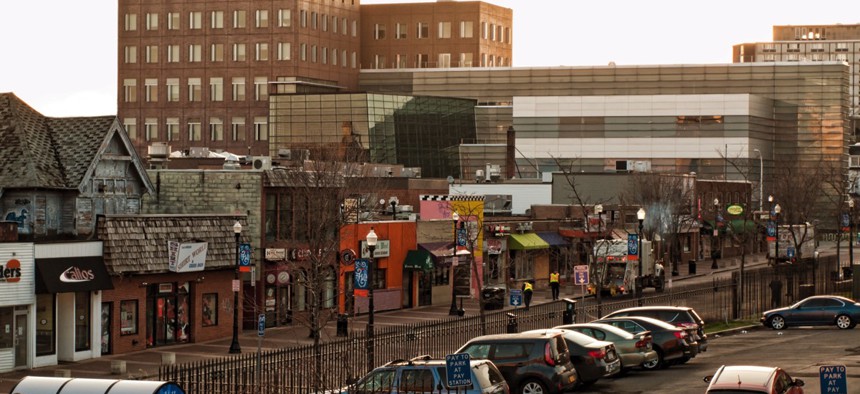The Cities Trumpcare Would Hurt (and Help)

Syracuse, New York is among the top 25 cities that will be hit the hardest under "Trumpcare."
Under the AHCA, urban centers dominated by poor people of color would feel the most pain.
Which cities would hurt most from the Trump-backed healthcare bill attracting withering criticism on both sides of Congress? According to a new analysis by WalletHub, urban places with large populations of poor, non-white policyholders would see the tax credits they receive under the Affordable Care Act more than halved under the GOP’s proposed plan, the American Health Care Act. Remote cities where healthcare expenses are extremely high would also feel the pain.
In a ranking of 457 U.S. cities with populations greater than 75,000, Yuma, Arizona clocks in as the city hit hardest by the proposed AHCA: the average couple would lose nearly $8,000 in subsidies. Yuma’s demographics mirror those who’ve benefited most from Obamacare: 18 percent of the city’s residents lives below the poverty line, 55 percent are Latino, and 21 percent are foreign-born, according to Census data. Following Wallethub’s methodology (which relies on this Kaiser Family Foundation’s Health Insurance Marketplace Calculator), the average joint-filing, two-person Yuma household—where neither individual smokes, both are of median age, and together bring in the city’s median income—are eligible for nearly $13,000 in annual tax credits under the ACA’s income- and location-based system. That would drop to $5,000 under the GOP’s strictly age-based subsidy plan.
Other hard-hit cities on the list are some of the most economically challenged places in the country. Many are cities with significant concentrations of low-income African-American residents: Syracuse, New York; Chattanooga, Tennessee; Birmingham, Alabama; and Bridgeport, Connecticut all make the top 25. Anchorage, Alaska, clocks in as the second-worst affected; although its residents are not particularly poor, its remote location makes healthcare costs extremely high there. The ACA addresses this, with Alaskans receiving some of the most generous subsidies in the country. (Relatedly, older, poorer folks who live in truly rural areas—in other words, Trump’s biggest supporters—may have the most to lose with the GOP’s bill out of everyone.)
There are also winners under Trumpcare—lots of them, according to this analysis, which shows that roughly three-quarters of the 457 cities would benefit from heftier tax credits. Wealthier towns where many people receive little or no subsidies under the ACA do particularly well: Average households in affluent Newport Beach, California; the Woodlands, Texas; and Virginia Beach, Virginia all net $5,000 or $6,000 credits they don’t currently receive.
Wallethub divides the 457 cities into different population tiers for a more apples-to-apples comparison of different-sized cities. Still, it is advisable to look at this ranking as an sketch, rather than a complete analysis, of Trumpcare’s urban impact, because it uses city limits as its geographic metric, rather than metro areas. A Wallethub analyst says via email that this approach “provided as few data limitations as possible,” but it gives a misleading impression of how the most economically powerful urban areas in the country would be affected.
Los Angeles, Atlanta, and Washington, D.C., for example, appear to benefit overall from the GOP-backed plan. But like many big cities, the areas that counts as “city proper” in these places have higher concentrations of wealth than the suburbs and towns that radiate around them. Atlanta’s suburbs are notoriously poor, and are plagued with high rates of chronic disease; replacing the ACA with a plan that ignores income and zip code would be the opposite of helpful.
Along the same lines, Wallethub doesn’t account for the share of city residents that are currently covered thanks to the ACA, nor how many would be projected to drop out of the marketplace due to the new plan’s cost hikes. It also says nothing about how rolling back the ACA’s Medicaid expansion would affect these cities. (Reliable Medicaid enrollment data is extremely hard to come by.)
As it is currently written, the AHCA seems to stand little chance of being passed. But President Trump has not stepped back from his support of the bill, even as conservatives and moderate Republicans in Congress have expressed their disappointment. A revised version goes up for vote in the House on Thursday, the seventh anniversary of President Obama signing the Affordable Care Act into law.
Laura Bliss is a staff writer at CityLab, where this article was originally published.
NEXT STORY: In Colorado, Rolling the Dice With Disaster Gets an Early Start This Year





